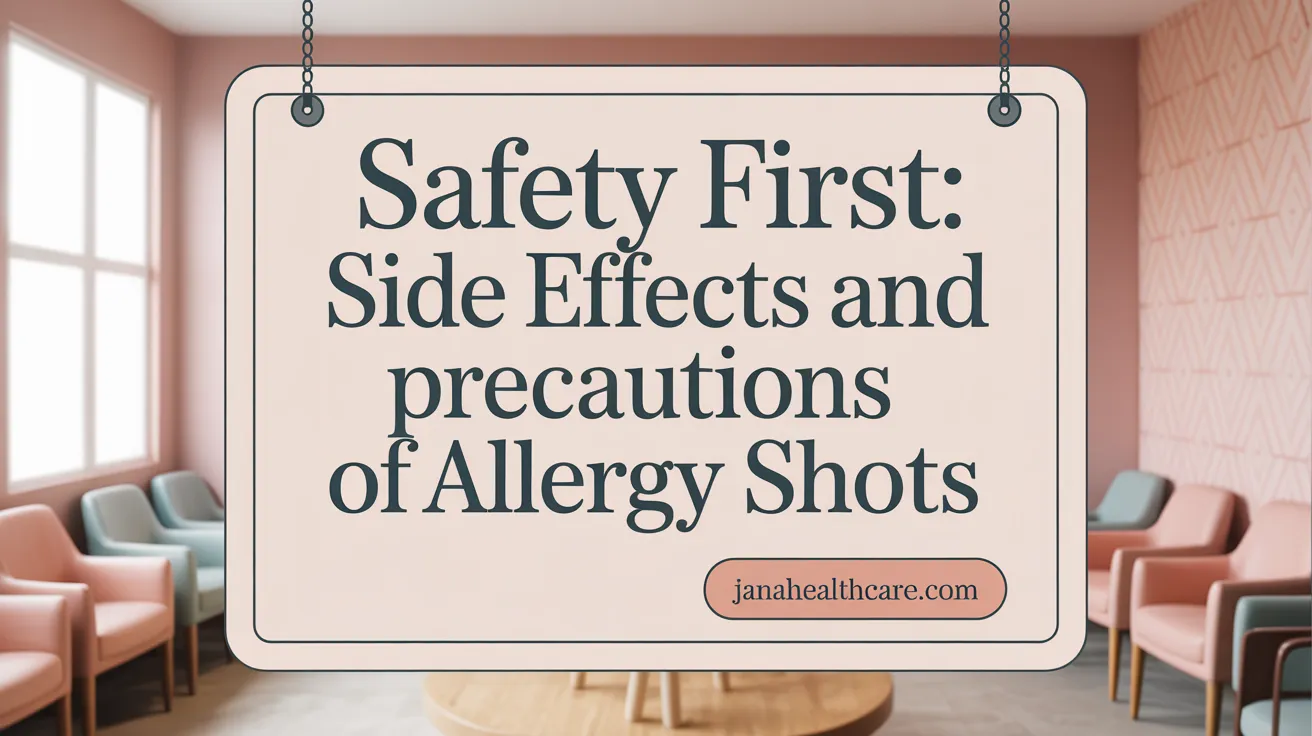Understanding Allergy Shots and Their Lifelong Benefits
Allergy shots, also known as allergen immunotherapy, offer a promising approach to significantly reduce allergy symptoms and even achieve long-term relief. By gradually training the immune system to tolerate allergens, these treatments provide an effective alternative to symptom-masking medications, targeting the root of allergic reactions. Over the course of several years, allergy shots can help sufferers reclaim their quality of life by lowering medication dependence and reducing the severity and frequency of allergies.
What Are Allergy Shots and How Do They Work?

What are allergy shots?
Allergy shots, medically known as allergen immunotherapy or subcutaneous immunotherapy (SCIT), are a treatment designed to reduce allergic reactions. These shots contain tiny, carefully measured amounts of specific allergens—substances that trigger allergic responses in susceptible individuals. By receiving these injections, patients train their immune systems to tolerate allergens better, leading to fewer and milder symptoms over time (How allergy shots work).
How do allergy shots work?
The underlying mechanism involves gradually exposing the body to allergens in controlled, increasing doses. This exposure encourages the immune system to shift its response: instead of producing allergy-causing immunoglobulin E (IgE) antibodies that lead to inflammation and allergy symptoms, the body begins producing immunoglobulin G (IgG) antibodies. IgG acts as a 'blocking' antibody, preventing allergens from triggering allergic reactions, effectively desensitizing the immune system and reducing inflammation (Understanding How Allergy Shots Work, Immunotherapy for Allergies).
Which allergens can allergy shots treat?
Allergy shots are beneficial for individuals with allergies caused by various environmental triggers. These include seasonal pollens (such as grass, tree, and weed pollens), indoor allergens like dust mites, pet dander, and molds, as well as venom from stinging insects like bees and wasps (Allergens treated by allergy shots, Allergy Shots for Seasonal Allergies). However, allergy shots do not treat food allergies, latex allergies, or medication allergies due to safety and efficacy limitations (Allergy shots not for food allergies, Who Should Avoid Allergy Shots).
Process of immune system desensitization
The treatment typically spans several years, beginning with a buildup phase where allergens are introduced in low doses, often weekly, gradually increasing over 3 to 6 months. Once the maintenance dose is reached, injections are given less frequently, usually once a month for 3 to 5 years (Maintenance phase of allergy shots. Over this time, the immune system adapts, decreasing its sensitivity and resulting in long-term symptom relief for many patients (Long-term allergy shot treatment, Allergy shots effectiveness).
The Allergy Shots Treatment Journey: Phases and Timeline

How long does a typical allergy shot treatment last?
A typical course of allergy shot treatment duration spans about 3 to 5 years. This period allows the immune system to be gradually desensitized to specific allergens, fostering long-lasting tolerance. Completing the full treatment duration is important to achieve sustained symptom relief.
What are the phases of allergy shot treatment?
The allergy shots process is divided into two main phases:
- Buildup Phase of allergy shots: This initial phase lasts from 3 to 6 months, during which patients receive weekly or bi-weekly injections. The allergen dose increases progressively to train the immune system to tolerate the allergens without triggering symptoms.
- Maintenance Phase of allergy shots: Following the buildup, the treatment enters the maintenance phase, which typically lasts 3 to 5 years. During this time, patients receive monthly injections at a consistent dose designed to maintain tolerance and maximize symptom control.
How soon do patients experience relief from allergy symptoms?
Many patients start noticing a reduction in allergy symptoms 6 to 8 months after beginning treatment, often during or shortly after the buildup phase. More significant and lasting improvements usually occur after completing the second year of the maintenance phase. Some patients experience long-term relief, with symptoms staying controlled even after finishing the injections.
This phased approach ensures a gradual and safe adaptation of the immune system, leading to effective allergy management over time. For more details on symptom improvement timeline with allergy shots, visit Effectiveness of allergy shots.
Effectiveness and Long-Term Benefits of Allergy Shots

How effective are allergy shots?
Approximately 80% of patients who complete allergy shot treatment experience significant improvement in their allergy symptoms. Treatment courses typically last 3 to 5 years, combining a buildup phase of allergy shots followed by maintenance phase of allergy shots. By the end of this period, many individuals enjoy lasting relief, with about 60% maintaining long-term benefits even after stopping injections.
Can allergy shots provide long-term or permanent relief?
Yes. Allergy shots not only alleviate symptoms during treatment but can also lead to long-lasting remission. The immune system develops tolerance to specific allergens, often resulting in substantial symptom reduction that persists for years beyond the end of therapy.
Do allergy shots help prevent the development of new allergies or asthma?
Research indicates that allergy shots may prevent the emergence of new allergies and reduce the progression from allergic rhinitis to asthma, particularly in children. This preventive effect highlights their role in modifying the course of allergic disease, not just treating symptoms.
How do allergy shots affect the need for allergy medications?
As allergy shots reduce the severity and frequency of allergic reactions, many patients can decrease or entirely stop using allergy medications like antihistamines and nasal sprays. This decrease contributes to an improved quality of life and lowers long-term medication dependency.
Safety, Side Effects, and Precautions of Allergy Shots

What side effects can occur from allergy shots?
Common side effects of allergy shots include local skin reactions such as redness, swelling, and itching at the injection site. Some patients may also experience mild systemic symptoms like sneezing, nasal congestion, or hives shortly after the injection. Although rare, severe allergic reactions such as anaphylaxis can occur, characterized by symptoms like throat swelling, difficulty breathing, or a drop in blood pressure. For more information, see Side effects of allergy shots.
How are patients monitored for reactions?
To ensure patient safety, individuals receiving allergy shots are monitored for at least 20 to 30 minutes after each injection. This observation period allows healthcare providers to quickly identify and respond to any immediate allergic reactions, including potentially life-threatening ones. Learn more about Post-injection observation and Allergy shots observation period.
Who should avoid allergy shots?
Certain individuals should avoid allergy shots or discuss risks thoroughly with their doctors before treatment. This group includes people with uncontrolled asthma, specific heart conditions, autoimmune diseases, or those taking medications such as beta-blockers and ACE inhibitors, which may complicate treatment or emergency care. Additionally, allergy shots are generally not recommended for children under the age of five due to challenges in managing treatment and ensuring safety. Read about Who should avoid allergy shots and Allergy shots contraindications.
How are serious allergic reactions managed?
Severe allergic reactions are promptly treated with epinephrine (commonly delivered via an EpiPen) alongside emergency medical care. Because of this risk, allergy shots must be given in a healthcare setting equipped with trained personnel and emergency equipment to manage anaphylaxis or other serious side effects safely. See details on Managing allergy shot reactions and Epinephrine Auto-Injectors (EpiPens).
Personalizing Allergy Immunotherapy and Exploring Alternatives
How is allergy shot treatment customized?
Allergy shots are specifically tailored for each patient following in-depth skin and blood allergy testing, including skin or blood tests. These tests pinpoint the exact allergens responsible for triggering symptoms. Accordingly, personalized allergen extracts are formulated for injections, targeting substances such as pollen, dust mites, pet dander, mold, or insect venom. This customized approach optimizes treatment effectiveness by focusing on the individual's unique sensitivities (Allergy immunotherapy overview.
What are the alternatives to allergy shots?
An increasingly popular alternative to allergy shots is sublingual immunotherapy (SLIT). SLIT involves placing allergen tablets or drops under the tongue once daily, usually at home. It is FDA-approved for certain airborne allergens like ragweed, grasses, and dust mites. Allergy drops, though not FDA-approved, are also used off-label and can be customized to cover a broader range of allergens including molds and pet dander. SLIT offers greater convenience, a reduced risk of serious reactions, and typically faster symptom relief compared to injections (Sublingual Immunotherapy overview, Allergy drops info).
Who are ideal candidates for allergy shots?
Ideal candidates for allergy shots are individuals aged five and older experiencing moderate to severe allergy symptoms that do not improve with medications or those wishing to decrease their reliance on medication. Patients allergic to airborne allergens or insect venom commonly benefit most. Allergy shots may not be recommended for children under five, those with severe asthma, certain heart conditions, or those on specific medications like beta-blockers. Careful evaluation by an allergist helps determine suitability (Who should get allergy shots, Allergy shots candidacy criteria.
What about the cost and insurance coverage?
The annual cost of allergy shots generally ranges from $1,000 to $4,000, influenced by geographic location, treatment duration, and healthcare provider fees. Many insurance plans, including Medicaid and Medicare Part B, often cover allergy immunotherapy when deemed medically necessary. Patients are encouraged to verify coverage details with their insurers to manage out-of-pocket expenses effectively (Insurance coverage for allergy shots, Cost of allergy shots.
Embracing a Future Free From Allergies
Allergy shots stand out as a highly effective, scientifically backed solution for individuals seeking lasting relief from allergic conditions. By targeting the root cause through immunotherapy, patients can experience remarkable improvements in symptoms, reduce medication dependency, and potentially prevent the progression of allergy-related diseases. While treatment requires commitment, it offers a safe and personalized path toward a life less burdened by allergies. Consulting with an allergist can open the door to this transformative therapy, making the possibility of saying goodbye to allergies for good a tangible reality.
